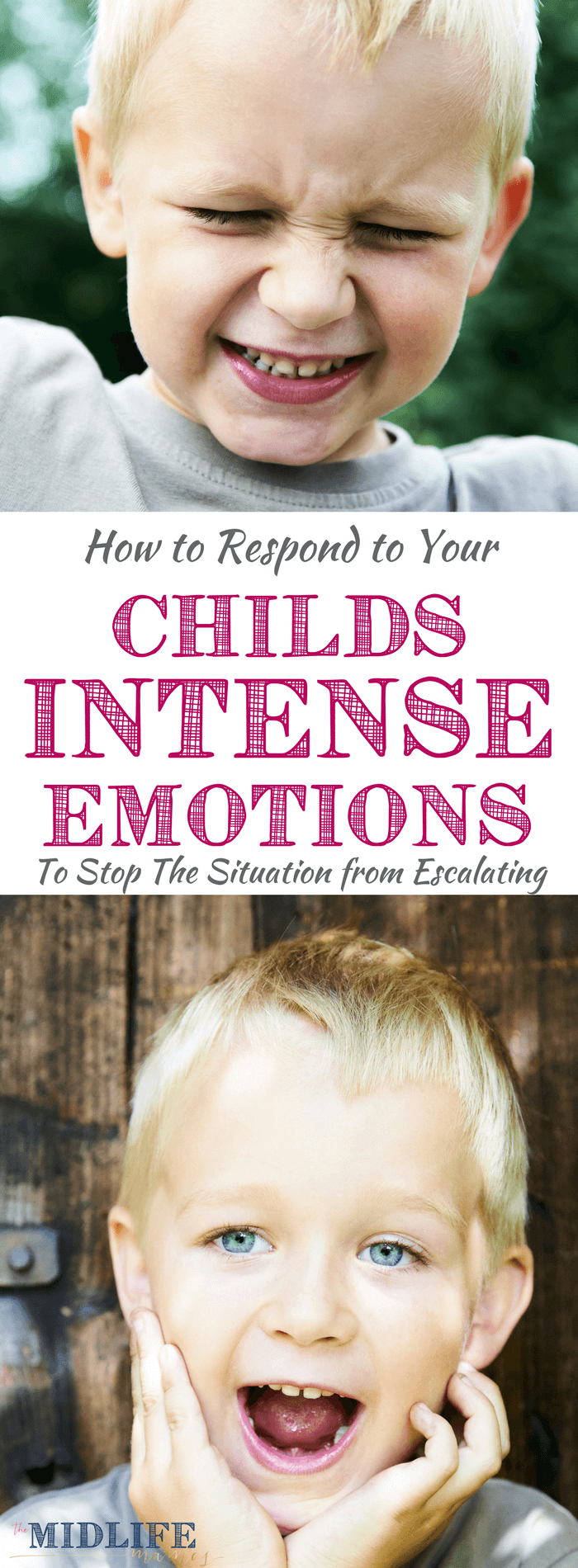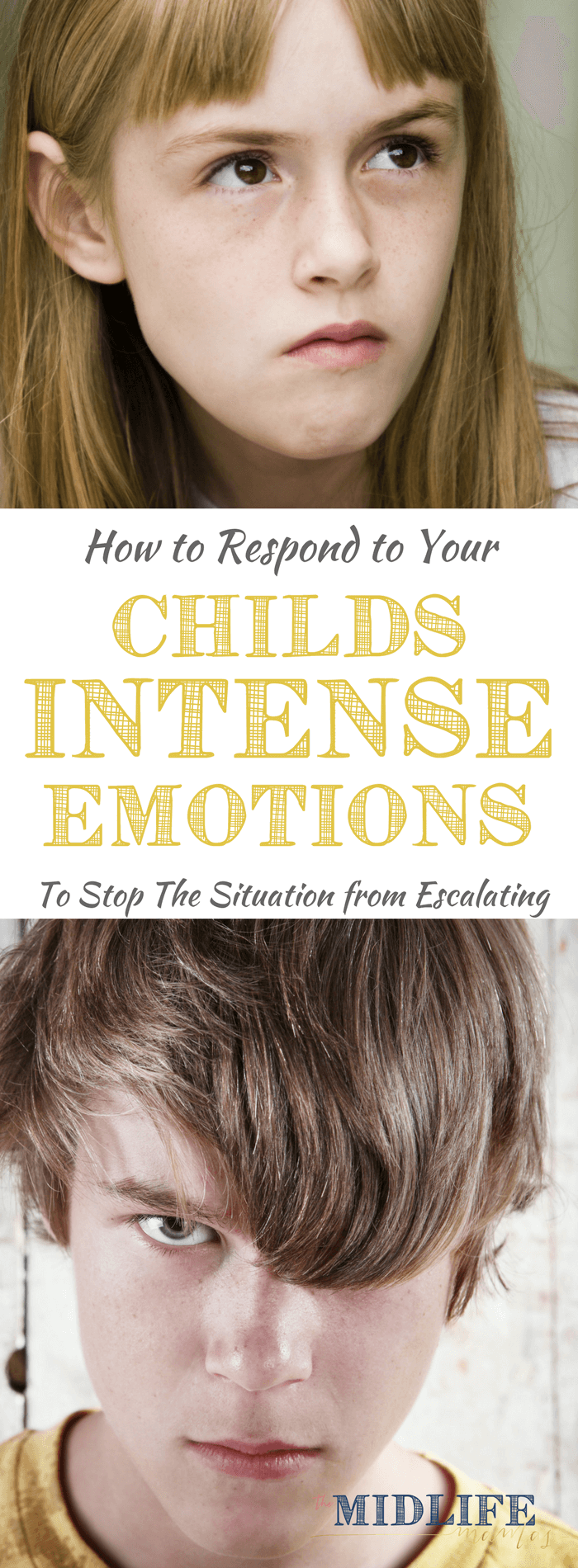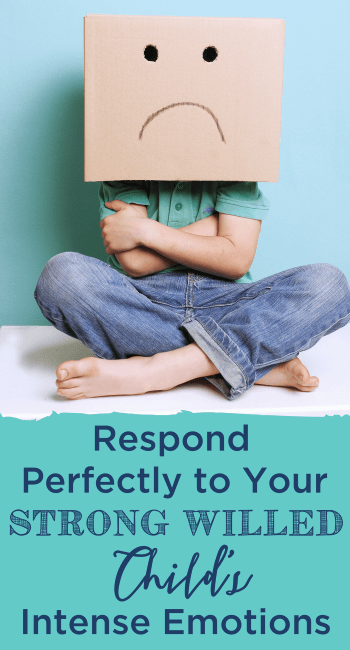Spoiler alert: For many moms out there – you know exactly what I mean when I say that raising a strong willed child requires some mad problem solving skills. I’ve learned positive strategies on the fly and I’ve learned a lot from other moms with spirited children. I’ve also picked up some great tips, like the one I’m sharing here, from the professionals. Because sometimes staying calm in the moment with my strong willed child is all I can do. And then I use a strategy learned from somebody else. Staying calm + a good strategy = a win in my book!
“You take things too personally.” I remember the precise moment, early in my life, when I first heard those words. “Huh??” Not only was the person who told me this completely on target, but it was such an issue for me that I didn’t even understand what she meant until years later. I might have been a spirited child who grew into a strong willed person.
And, I’ve taken this trigger with me into my parenting. My biggest challenge is keeping my emotions in check, especially when my strong willed child is going haywire over something that’s clearly important to him. It’s all too easy to take the anger and frustration personally, isn’t it?
Related Post You May Also Enjoy: One Word to Encourage Self Esteem
…strong-willed kids as people of integrity who aren’t easily swayed from their own viewpoints. Strong-willed kids are spirited and courageous. They want to learn things for themselves rather than accepting what others say, so they test the limits over and over. They want desperately to be “in charge” of themselves, and will sometimes put their desire to “be right” above everything else. When their heart is set on something, their brains seem to have a hard time switching gears. Strong-willed kids have big, passionate feelings and live at full throttle. (Strong Willed Children)
Sounds great, right? How do you feel about raising a child who may just be impervious to peer pressure?
Your child is the one who will turn down the little blue pill at a high school party. He will stop a friend from drinking and driving. Your child is the one who will start a small business and grow it into a billion-dollar company. This child will eventually parent with patience and guidance… (Raising Strong Willed Toddlers)
Parenting a strong willed child while trying to avoid power struggles, stay calm, and actually getting your child to listen can seem beyond anyone’s abilities!
So instead of locking myself in the closet with a sleeve of OREOs and a bottle of pinot noir, I decided I needed to find a better parenting strategy. One that didn’t involve me beating myself up for being the worst mom ever.
Does Whispering Work In Response to the Intense Emotions of Your Strong Willed Child?
I had heard the tip about whispering to your child when she is upset so that she will need to lower her voice to hear yours. Two things here. First, I’m pretty sure my children could care less what I’m saying when they are so upset that they are screaming. Or screaming and crying. Unless it’s, “Yes muffin, I will let you eat only candy and cake and buy you a big huge LEGO set every single day for the rest of your life…” I don’t think they give a flying squirrel.
Second, I was certain I would feel a little stupid whispering at my screaming, angry child. Let’s review – my child is a big hot screaming mess and I’m going to whisper??? Desperation made me try anyway. It didn’t work. And I felt stupid.
Does Yelling at Your Strong Willed Child Work?
Next I opted to retreat into my old school comfort zone: yell. But this time I was justified, right? I mean, my strong willed child is yelling at the top of his tiny lungs. If I don’t yell, how will he be able to hear me? I simply want my child to hear me. Sounds legit, right? I wondered…
But here’s the thing I quickly realized about that…yelling (even if it was originally just so that I could be heard) made me angry.
It threw me right into the chaos!
Yelling physically amped me up, tossed me right into the vortex of anger and actually created more anger. Not. Helpful.
Add to this that when intense emotions overwhelm your child, she can’t hear you.
Fight, Flight, or Freeze Means She Can’t Process What You’re Saying
Even if she wants to hear you, she can’t because she has entered the “fight, flight, or feeze” mode.
[A]nger comes from our “fight, flight or freeze” response. That means it’s a defense against threat. Occasionally that threat is outside us, for instance, when a big brother knocks down a block tower. But usually it isn’t. We see threats outside us because we’re carrying around old stuffed emotions like hurt, fear or sadness. Whatever’s happening in the moment triggers those old feelings, and we go into fight mode to try to stuff them down again.
Losses and disappointments can feel like the end of the world to a child, and kids will do anything to fend off these intolerable feelings, so they cry and rage and lash out. If they feel safe expressing their anger, and we meet that anger with compassion, their anger will begin to melt. (source)
I finally found a way to handle intense emotions that’s about as close to perfect as I’ve found anywhere. It is intense enough that they want to hear me and it also provides a quick break that allows them to be capable of hearing me in the moment and not something even more intense that overwhelms them even more.
Related Post You May Also Like: Want to Help Your Child Have Fewer Hard Times?
An Genuine & Empathetic Response To Your Strong Willed Child
So here’s the thing. When your child is that angry, your response needs to be intense. Your response has to be intense, or it won’t grab their attention.
And while being angry and yelling are intense emotions they are definitely not what I’m talking about here.
Let me be super clear – yelling intensely is not what I’m talking about.
When you can reflect your child’s emotions back to them with the same intensity that they are displaying, and remain empathetic and respectful, it’s the perfect response! It’s tricky – but it works.
Since matching the intensity of your child’s anger with your intense anger typically just creates an explosion, you’ve got to match it with something equally intense, but try the opposite of angry.
Other than anger, what emotions are intense? Love? Empathy? Humor? Curiosity? How could I use these? I decided to match the intensity of his anger with the intensity of my love and empathy!
Emotional Intensity Without Anger
So how do you do that??? Here’s a great example. My son was engrossed in building a LEGO set. I needed him to take a break and come get ready for school. So he came, but he was pretty angry about having to break from his play. “I don’t want to get ready for school,” he yelled. So I met his intensity with a similar level of intensity saying “I don’t want to get everyone ready for school either!!!”
And I said it with an empathetic and not sarcastic tone. I gave it an “OMG! Me too! I also don’t like what I’m doing right now! What a coincidence!!!” Genuine: “I really don’t want to do what I’m doing, either…doesn’t it sort of stink?” My response was intense so that he could hear me and it expressed my empathy so he wanted to hear me. And it was something truly unexpected that jared him out of his frustration for at least a moment.
A Second Opportunity With My Strong Willed Child
My son was unhappy about having to do something before his brother. It seemed really unfair to him and he got angry. (It was before breakfast, so there might have also been a touch of hangry…) “Why do I ALWAYS have to go first? He NEVER goes first…ever! It’s alway me first. I’m not doing it. I’m not going first!”
So I adopted his tone and level of frustration and reflected back to him “I HATE always having to go first, too! It’s the worst, isn’t it?? I wouldn’t want to go first AGAIN either!!!!” Just that moment of reflecting back his feelings, with matching intensity, allows him to feel heard long enough to come out of his anger so that we could move forward. And then, for extra credit, I added in an extra to help him identify the true cause of distress. “You know, when I go first, sometimes I worry if I will do a good job. It helps me to watch a couple people go before me. Have you ever felt that way?”
Why This Tactic Helps
He may still not want to go first, but at this point we can discuss it. He’s available to receive the lesson or the conversation and to breathe deeply and further soothe his big emotions. It hasn’t spiraled out of control. It hasn’t gotten me pulled in to his anger. We’ve both emerged unscathed and now I have an opportunity for real teaching.
Sometimes matching the intensity of their frustration or anger can be tough without getting angry yourself. I’ve put together some great alternatives for you – so that you can match your child’s intensity with positive emotions. Sign up here and I’ll send you a free “Intense But Not Angry” printable which is a super simple reference for emotions that you can quickly and easily turn to when your child is frustrated or angry that will prevent the anger from escalating.
The Warning
In both of these instances, my face reflected:
- Surprise – I showed surprise that we were both feeling something similar at the same time;
- Silliness – Without technically being silly, I hoped that he might, just might, see the silliness in my exasperation; and
- Exasperation – We are both exasperated and experiencing similar things at the same time. Maybe we can help each other work through it.
It’s sort of an over the top emotional intensity (to match their intensity).
But mind you – it’s easy to cross a line into mocking their intensity. And you must never cross a line that even whiffs of mockery. Make sure that you aren’t mocking your child’s feelings.
You will only make the situation worse! So just match their intensity in a genuine and empathetic way.
Every child / parent bond is special and unique. This is a great tip that works with my children and I’ve seen it work with many other children and their parents. Give it a try!!
Don’t Take It Personally
It can be easy to take things personally. What’s more personal that your own child? Remember, your child’s behavior is not about you. It’s not a referendum about whether you are a bad parent or whether they love you. These big emotions, especially in strong willed children, are merely a sign that they are overwhelmed and need our help.
Children Need to Have Their Anger Accepted and Normalized
There are some terrific tools to help your children learn about anger. Anger can be both overwhelming and frightening for children – but it is a healthy and normal emotion. Here are some favorite books with characters that children can relate to to help them learn more about how to handle the perfectly normal emotion of anger.
Anger Management Workbook for Kids: 50 Fun Activities to Help













PS – I have one more FREEBIE to help you with your strong willed child. If your trying to resist your urge to respond in anger, my friend Amanda over at Messy Motherhood has an amazing list of 50 Calm Down Tips that are FREE! Just click on this link to get them sent to you right away!





